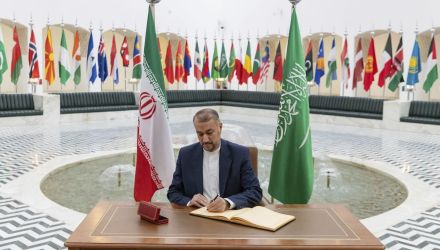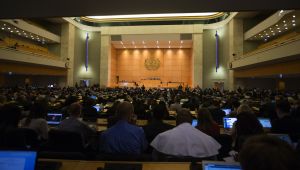As neither a military strike nor sanctions are particularly attractive options for dealing with North Korea, the Bush administration would be wise to offer Pyongyang a meaningful package of incentives
The fires of the Middle East must not be allowed to distract the world's attention from the threat posed by North Korea's nuclear ambitions, which it demonstrated by its recent test of a long-range missile. Yet that is what appears to be happening.
In the middle of this month, the G8 summit in St. Petersburg ended by calling on North Korea to stop its missile tests and to abandon its nuclear weapons program. This followed a UN Security Council resolution that condemned North Korea's missile launches on July 5, demanded that it return to the negotiating table, and required UN members to prevent the import and export of any material or money related to North Korea's missile or unconventional weapons programs.
Chinese President Hu Jintao urged progress in the stalled talks so that "the entire Korean Peninsula can be denuclearized." This seemed like a diplomatic breakthrough, but there was less forward movement than meets the eye.
During its first term, the administration of US President George W. Bush hoped that it could solve the North Korean nuclear problem through regime change. The hope was that isolation and sanctions would topple Kim Jong-il's dictatorship. But the regime proved resistant, and the Bush administration agreed to enter into six-party talks with China, Russia, Japan and the two Koreas.
Last September it appeared momentarily that the talks had produced a rough agreement that North Korea would forgo its nuclear program in return for security guarantees and removal of sanctions. But the loosely worded accord soon collapsed, and North Korea refused to return to the talks until the US stopped shutting down bank accounts suspected of counterfeiting and laundering money for Kim's regime.
Diplomacy remained stalled until North Korea launched a series of missiles into the Sea of Japan this month. Japan called for UN Security Council sanctions, and after 10 days of wrangling, all five permanent members agreed on a resolution condemning North Korea's actions.
Why did North Korea risk taking actions that defied China, its main benefactor, and brought about the UN resolution? In part, it acted because it saw the great powers offering Iran an interesting package of incentives to give up its nuclear enrichment program, while North Korea was being relegated to a diplomatic side track. But it also acted because taking such risks has proven successful in the past, and here, Kim probably believed the risks were low.
Kim knows that the five other countries in the six-party talks are divided. While all five want a non-nuclear North Korea, China and South Korea place a higher priority on the stability of the North Korean regime than the US and Japan do.
South Korean public opinion is split on how to handle the North, but the majority fear that a sudden collapse would have catastrophic effects on the South's economy. Many in the younger generation have no direct memories of the Korean War. Thus, South Korea's "sunshine policy" of economic engagement with the North commands majority approval.
Similarly, China, with its focus on economic growth, fears that a collapse of the North Korean regime would threaten stability on its borders. Thus, while China has occasionally pressed North Korea to abandon its nuclear weapons program, it has been unwilling to exercise its economic leverage to a point that threatens the regime.
Because its preferred approach of regime change has proven slower than expected, and because time plays into Kim's hands, the Bush administration faces three other options in attempting to deal with North Korea's nuclear weapons. It could use force, and some officials have argued that if North Korea launched a war in response to a limited US air strike, Kim would lose his regime. Thus, war would be unlikely.
But it is unlikely that an air strike would destroy North Korea's hidden facilities, which include more than 10,000 artillery tubes buried in caves along the demilitarized zone. North Korea could simply shell Seoul in response and wreak havoc on the South Korean economy. Thus, South Korea, together with China, would likely react strongly against a US air strike.
A second option is sanctions. Some in the Bush administration believe that even if economic sanctions would not end the regime, they might cause enough pain to force Kim to give up its weapons. They point to the success of efforts to shut down illegal banking transactions and to the Proliferation Security Initiative (PSI), in which other countries agree to interdict transport of nuclear materials.
But success depends upon China, and South Korea and China failed to participate in recent PSI exercises. In the wrangling over the UN resolution, China threatened a veto if there were any references to Chapter VII of the UN Charter, which allows enforcement.
Knowing that China will not allow sanctions to cut too deeply, Kim is unlikely to give up his nuclear ace. That leaves the third option, a diplomatic bargain, for which Kim's price is direct talks with the US, a security guarantee, and the type of economic incentives that were offered to Iran. Bush has allowed his representative to the six-party talks to meet separately with the North Koreans within the six-party framework, but he failed to provide adequate incentives.
Given North Korea's past deceptions, and the difficulty of verifying denuclearization in a totalitarian country, a verifiable agreement will be difficult to reach. But given the other options, the US would be wise to start thinking of a new diplomatic package.
Joseph Nye, a former assistant US secretary of defense, is Distinguished Service Professor at Harvard University.
Nye, Joseph. “Taming North Korea.” Taipei Times, July 31, 2006




